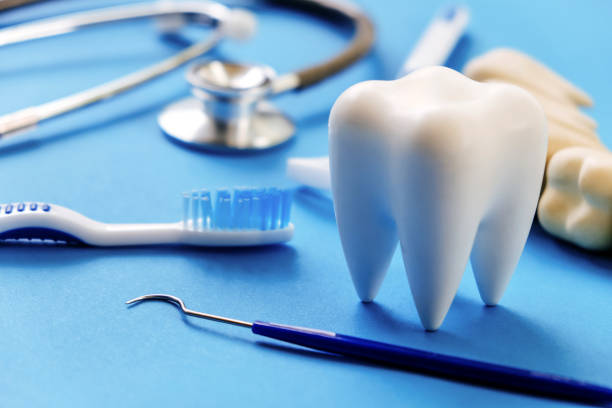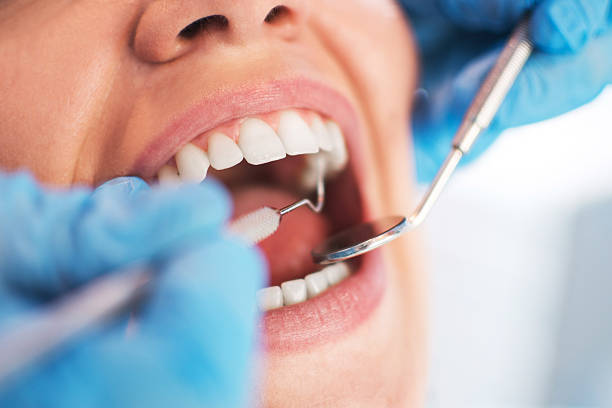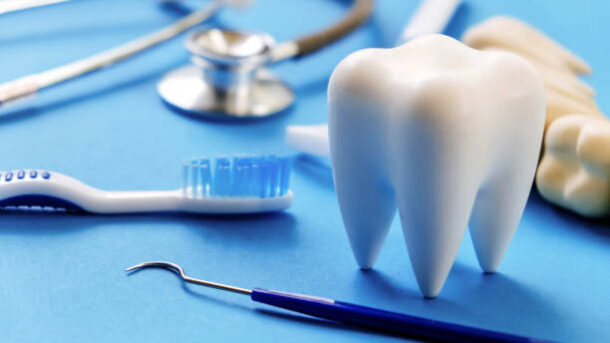Oral hygiene is vital to overall health, and the right tools are key to maintaining it. Choosing the right oral care tools can be overwhelming, as there are countless options to choose from. This guide is designed to help you navigate the selection process and ensure you have the best tools for maintaining a healthy smile.

Understanding the Basics: Toothbrushes
Choosing the Right Toothbrush
- Type of Bristles: Soft bristle toothbrushes are recommended for most people because they are gentle on gums and enamel while being effective at removing plaque.
- Size and shape: The head of your toothbrush should fit comfortably in your mouth, allowing you to reach all areas with ease.
- Manual vs. electric: Electric toothbrushes are more effective at removing plaque, especially for people with limited manual dexterity or special dental needs, such as dental implants.
Brushing Tips
- CORRECT ANGLE: Hold the brush at a 45-degree angle to the gums to effectively clean the gum line.
- Brush gently: Apply gentle pressure and use a back-and-forth circular motion.
- Duration: Brush twice a day for at least two minutes, making sure to cover all surfaces of each tooth.
The Role of Toothpaste
Choosing the Right Toothpaste
- Fluoride Content: Fluoride strengthens teeth and helps prevent cavities.
- Specific Dental Needs: Toothpastes formulated for sensitive teeth, gum health, or whitening can address individual dental concerns.
Importance of Flossing
Choosing the Right Floss
- Waxed vs. Unwaxed Floss: Waxed floss is easier to slide between teeth and is suitable for tight spaces.
- Flossing aids: Flossers or water flossers are helpful for those who find traditional floss difficult to use.
Flossing Tips
- APPROPRIATE LENGTH: Use about 18 inches of floss, wrapping most of it around one finger and the rest around one finger of your other hand.
- Insert Gently: Gently insert the floss between your teeth using a back-and-forth motion.
- C-Shape: Bend the floss into a “C” shape around each tooth and gently rub it under the teeth and gum line.
Mouthwash: Other Tools
Choosing the Right Mouthwash
- Cosmetic vs. Therapeutic Mouthwash: Cosmetic mouthwashes temporarily freshen breath, while therapeutic mouthwashes contain active ingredients that help reduce plaque, gingivitis, and tooth decay.
Specialized Tools for Specific Dental Conditions
Tools for Unique Needs
- Orthodontic Care: For people with braces, orthodontic floss and interdental brushes make it easy to clean around wires and brackets.
- Dentures and implants: Specialized cleaners are available for the maintenance of removable dentures and implants.
The Importance of Regular Replacement
Replacing Tools Regularly
- TOOTHBRUSHES: Replace your toothbrush every three to four months, or sooner if the bristles are worn.
- Floss: A new piece of floss should be used for each tooth to avoid plaque re-deposition.
Using Advanced Oral Care Technology
Embracing Innovation
- Electric toothbrushes with smart technology: These toothbrushes provide feedback on your brushing habits to ensure a thorough clean.
- Water flossers: ideal for people with braces, dental implants or gum disease.

Personalized Advice from Your Dentist
A consultation with your dentist can be invaluable in choosing the right oral care tools for your specific needs. Your dentist can provide personalized recommendations based on a variety of factors, including the health of your teeth and gums, any existing dental work, and your overall oral hygiene habits.
For example, if you have sensitive teeth or suffer from gum disease, your dentist may recommend a toothbrush with extra-soft bristles or a specific type of toothpaste.
Similarly, if you receive complex dental treatments such as crowns, bridges, or dental implants, your dentist may recommend special tools or cleaning techniques that are best suited for maintaining these restorations. This personalized approach ensures that you are using effective tools and avoiding tools that may be harmful to your particular oral health condition.
The Role of Regular Dental Visits in Oral Care Tool Selection
Regular dental visits are an excellent opportunity to discuss and improve oral hygiene routines. During routine checkups or dental cleaning and counseling appointments, your dentist can evaluate the effectiveness of your current oral care tools and make recommendations for improvements or updates. These visits also allow for a professional evaluation of brushing and flossing techniques to ensure you get the most out of your oral care regimen.
Additionally, dentists can keep you up-to-date on the latest advances in dental care products and technologies, such as the latest electric toothbrushes or water flossers, to help you stay on the cutting edge of effective oral hygiene practices. With their expert guidance, you can be sure that your oral care routine is thorough and optimizes your long-term dental health.



